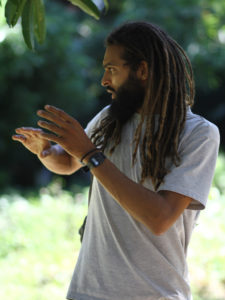I used to tell myself this story that I wasn’t creative. I don’t play any instrument particularly well, I have absolutely zero interest in jewelry making, and my drawings are on par with your average third grader. I thought, I’m a left brain dominant guy, and that’s that. Music, dance, and art are for other people, I prefer the comfort of data, numbers, and spreadsheets.
As I began to reflect on who I was through my practices, I realized that my genetics didn’t create an uncreative person, my own attitudes did. When I was a kid, I played piano quite well, I was in choir, and I never met a coloring book I didn’t like. What changed that made me label myself as uncreative?
The answer, of course, was that I grew up in a culture that punished imperfection. At some point, most of us have felt judged in a vulnerable moment. Someone, at sometime, told us we aren’t good at something, and that embarrassed us. Sometimes, we’re strong enough to ignore that criticism and keep on doing what we’re doing because it’s enjoyable for us. Other times, we cease that activity because it hurts to hear that we’re not good enough.
I fell into the second group more often than not. I wanted to fit in and gain the approval of my peers, especially as a teenager. I did unfathomable things that I didn’t want to do, and stopped doing things I wanted to do just to fit in. In some ways, I used that pressure to be perfect to achieve positive outcomes, like honing my basketball skills to the point that I got a college scholarship. The downside of that pressure was that I felt like it was tantamount to social self-immolation to sing or dance or do any number of creative expressions in a way that wasn’t “acceptable”.
A necessary component to finding out who I am and who I want to become was to separate from the crowd I grew up with. I slightly reinvented myself each time as I went to college, moved to a new town, and moved to a new country. I relished the opportunity to let go of who I used to be and instead portray myself as the person I actually wanted to be. I challenged society’s and my own idea of who I was supposed to be. I questioned why I thought this or that wasn’t for me. With enough practice and support, I understood that I was capable of so much more than I had limited myself to.
About six years ago, I decided to challenge this belief that I was not musical. I chose to learn to play the ukulele. It was an easy instrument for a beginner to pick up, and I spent hours and hours strumming basic songs, and singing for the first time in many years. Singing felt good, like a pleasure I had long denied myself. I wasn’t going to win any awards for my voice, but I wasn’t singing for anyone else’s approval anymore. I was singing for more than just the pleasure of it too, although that was a pleasant side effect. I was playing and singing to break down this self-limiting belief that I’m not creative. This practice of defying these beliefs has led to an upwelling of confidence in my potential to do and be many things that I thought were not for me.
I was sharing this belief that I’m not creative with friends a few years ago, and one friend was amazed that I thought that way. Why, I’d created Suan Sati! How is that any different from taking a blank canvas and making it into a beautiful work of art? When I thought about it that way, it dawned on me that I was indeed a creative being. Just because I don’t spend my time on some of the same art forms as others doesn’t mean I’m not creative. I have an uncanny gift for imagining what is not yet birthed into this world, but could be. My mediums are designing physical spaces, devising business systems and tools, inventing programs with heart, sequencing innovative yoga classes, and creating loving interpersonal webs among staff and guests, among many, many others.
I wholeheartedly reject any notion from myself or others that I am not creative because I don’t conform to “traditional” art forms. Enough with the creativity gatekeeping, both from ourselves and from others. We are all creative, we just need to find our medium. It might be a paintbrush, it might be a hammer and nails, it might be with the way that we hold space for others. No matter how it’s expressed, allow yourself to connect with your creative side by letting go of the idea that you’re not creative. You may just find that you’re already really creative in your own unique way!
Here are a few tools that might be helpful to nurture your creativity.
- Allow yourself to be imperfect. Enjoy the journey, not just the outcome.
- Play! This could be a game, a puzzle, telling stories, really anything non-competitive and fun!
- Try something new. Step outside of your comfort zone and give something new a try. This is a great way to build new neural connections and get the creativity flowing.
- Follow your interests and curiosities. You don’t have to be “good” at it to enjoy it.
- Move your body. Get your blood moving to stimulate your brain. Research has also shown that walking rather than sitting creates 60% creative output. So get on up and move it!
- Rest. Take the pressure off, and you might find that creativity flows into you effortlessly.

